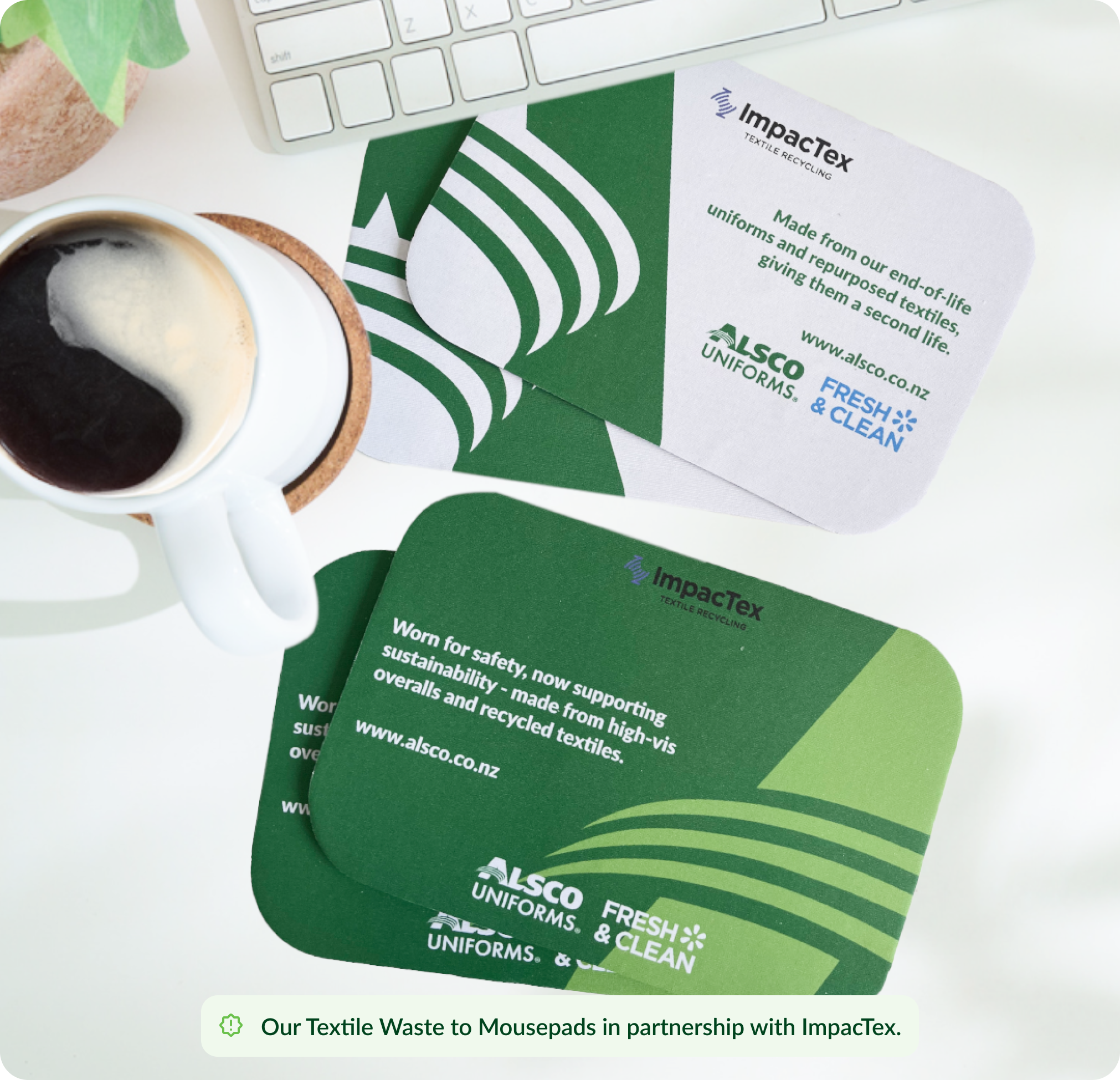
Connecting with Our Planet
Collaboration: The Key to Effective Change
At Alsco Uniforms®, we believe that collaboration drives sustainable change. Carbon reduction, waste elimination, and recycling are vital, but we recognize that working together is essential to achieving the global impact we need. That’s why we focus on building partnerships, both within our industry and beyond, to make real progress towards a greener future.
Optimising Process Energy: Transitioning to Renewable Sources
As part of our Four Big Bold Sustainability Goals, Alsco Uniforms® is committed to reducing energy consumption by transitioning from coal-fired energy to renewable alternatives. This shift is crucial for lowering carbon emissions and improving overall energy efficiency in our operations.
Key Initiatives:
Richmond
In 2012, our Tasman facility switched from coal to biomass, using carbon-neutral wood pellets, improving air quality and reducing smoke emissions. This transition is supported by local supplier Azwood.
Invercargill
In 2021, we began successful woodchip boiler trials with Ahika. By 2024, a new biomass boiler will replace the existing one, cutting 4,075 tonnes of CO2 annually—22% of our carbon footprint in New Zealand.
Christchurch & Dunedin
A new biomass boiler will be installed in Christchurch by September 2024. Additionally, the Energy Transition Accelerator (ETA) review will help guide our transition to low-carbon fuels for our Dunedin facilities.

Electric Vehicles: Leading the Charge Toward Clean Transportation
Alsco Uniforms® is leading the way in clean transportation by transitioning our fleet to electric vehicles (EVs). As part of our bold sustainability goals, we are electrifying one-third of our fleet by 2030. Our commitment to reducing carbon emissions and promoting green energy solutions is evident in the significant strides we’ve already made in adopting electric vehicles across New Zealand.
Key Achievements:
Richmond
19,299 km driven
contributing to 9.91 tonnes of CO2 savings.
Invercargill
25,698 km driven
saving 7.34 tonnes of CO2 so far.
Christchurch & Dunedin
18,828 km driven
saving 17.71 tonnes of CO2, 60.76 tonnes projected.
Christchurch & Dunedin
14,276 km driven
with 4.67 tonnes of CO2 savings to date.

Water Savings: Investing in Efficient Technology
Water is a precious resource, and we’re committed to reducing water usage across all our facilities. Continuous Batch Washers (CBWs) are a key technology in this effort, as they use significantly less water than traditional washing systems by recycling water within the machine.

Waste Reduction: Moving Toward Zero Waste
Alsco Uniforms® has made significant progress in waste reduction by adopting better waste segregation practices, recycling, and promoting staff education. This effort aligns with our bold sustainability goal to achieve zero waste by 2030.
Key Actions:
Collaborative Partnerships
We’ve partnered with initiatives like the Textile Reuse Programme, ImpacTex, and joined the Sustainable Business Network’s (SBN) Sustainable Procurement Advisory Group to exchange strategies.
Supply Chain Collaboration
By working closely with our supply chain, we’ve educated key stakeholders and learned from their waste reduction efforts, fostering a collective approach.
Waste Diversion Impact
We’re committed to diverting over 200 tonnes of waste from landfills annually, cutting 250 tonnes of CO2e in the process.


Transforming Waste into Purposeful Products
Since teaming up with ImpacTex in October 2022, Alsco Uniforms has recycled over 79,174 kilograms of garments from our branches across the motu, about the weight of 12 African elephants! This collaboration has not only kept textile waste out of landfills but also avoided more than 254 tonnes of CO₂ emissions, which is like removing 80 cars from the roads.
ImpacTex is an innovative textile recycling company that turns end-of-life garments into creative and useful products, including outdoor signage, acoustic panels, and wine holders. We’re proud to have supported their mission from the start. At Alsco Uniforms, we are committed to taking responsibility for the entire lifecycle of our products, and addressing textile waste is just one way we’re putting that commitment into practice.
Recently, we transformed our retired uniforms and hi-vis gear into custom mousepads as a special giveaway for our customers.

Join Us on Our Sustainability Journey
At Alsco Uniforms®, we’re committed to sustainability through energy optimisation, electric vehicles, water conservation, and waste reduction. Join us in creating a greener future.
IT PAYS TO KEEP CLEAN®
The Alsco Uniforms® Way
Join our mailing list for the latest in workplace hygiene, sustainability, and Alsco Uniforms’® innovations. Stay informed and keep your business clean, safe, and efficient.





